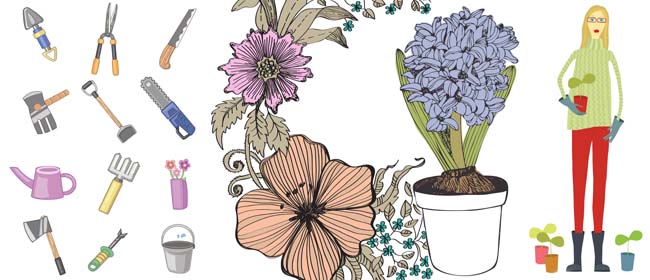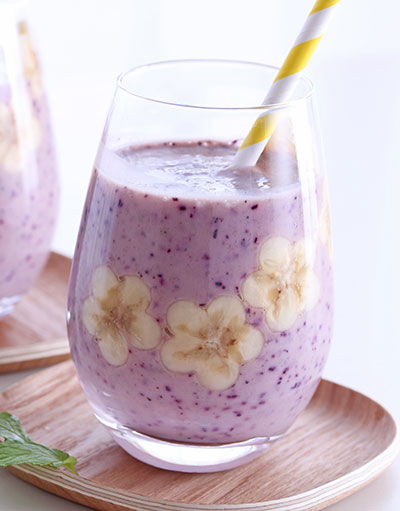
We have collected all the gardening hints and tips that we have featured in our weekly newsletter and grouped them together in one convenient spot for you to peruse. Find tips on growing plants, keeping pests at bay and making natural fertilisers. We’ll keep adding to our list, so keep checking back for more great tips.
If you have a tip to share with us we would love to add it to our list. Email your tip to us here.
Gardening tips
- When planting your tomatoes this year, mix some crushed eggshells into the soil. The eggshells are a great source of calcium and will help maintain the health of your plant. Also beneficial to aubergines and capsicums (bell peppers).
- When taking cuttings, dip ends in a blob of Vegemite or honey before potting in propagating mix. Vegemite and honey both have natural hormones that encourage roots, and honey protects against fungus.
- The basil plant you buy at the supermarket is actually a cluster of seedlings. When you have harvested what you need, separate the seedlings and plant them in a warm sheltered spot, similar to greenhouse conditions, and they should grow into big healthy plants.
- Carrots need a loose, stone-free soil to grow straight. To help them along, make holes in the soil with a broom handle. Fill the holes with potting mix, then sow seed directly into them.
- In hot, humid areas, roses are prone to fungal diseases. Spray weekly with an organic spray. Mix 3 teaspoons of baking soda (a natural fungicide) and 2 or 3 splashes of fish emulsion (fertiliser) in half a bucket of water. Then spray.
- Treat your brassicas to a drink of beer. Ancient wisdom says brassicas are old soaks. Cabbages in particular are said to enjoy a regular drink, as do delphiniums and hollyhocks.
- It’s important to keep the leaves of your houseplants clean. A layer of dust and grime prevents leaves from absorbing the light they need for photosynthesis, the process by which light is converted into energy for growth.
- To keep your household plants looking great, buy two identical plants and keep one in a sunny or well lit area, then swap them round from time to time to give both plants equal time in the sun. Tip from Dennis of Auckland, NZ
- The humble tea bag can be very beneficial to your garden. Acid-loving vegetables, such as potatoes, endives, capsicums (peppers), parsley and rhubarb, love cold tea. Pour left-over tea onto your veggie patch, or sprinkle used tea leaves around the base of plants.
- When pruning trees, seal major cuts with a pruning paste to keep out diseases and insects such as borer. If you don’t have pruning paste on hand, use acrylic paint instead.
- Instead of buying plastic labels from the garden centre to label your seedlings and cuttings, make your own from plastic milk bottles. Cut the milk bottle into strips and use a permanent marker to identify what you’ve planted. Plastic yoghurt containers also work well.
- Don’t throw away seed heads after deadheading. Bundle them together to form a bird bouquet and hang from trees for birds to feed upon.
Pest deterrent tips
- For an all-purpose insecticide that deals to aphids, caterpillars and other nasties, place equal quantities of chopped mint, onion, garlic and lavender (flowers and stems – a natural insecticide) into a bucket of water. Leave for 24 hours, strain, then spray on plants.
- Tomato foliage contains a poisonous alkaloid, known as solanine, which is deadly to many pests, including aphids. Instead of throwing away those tomato laterals, place in an old food processor, cover with water, add a couple of tablespoons of cornflour and mix together. Strain before using as an insecticide on roses and other ornamentals.
- Snails devouring your vegetable plants? Place a couple of comfrey leaves at the base of your plants. As the comfrey leaves break down, the slugs and snails will eat those instead of your veggies. This works well for hostas and other susceptible plants.
- Lay planks or boards between your rows of vegetables – snails will gather underneath them at night, then you can pick them off during the day.
- Placing white eggshell halves around your brassicas is said to deter white cabbage butterfly. Flying adults see the shells and conclude that others have laid their eggs there, and move on. Rinse eggshells first, or they may attract other critters.
- Mint can be used as a pest deterrent. A few drops of peppermint oil in water repels mosquitoes, while dried pennyroyal leaves scattered on bookshelves deters silverfish. Most mints also help repel moths from clothes.
Storage and cleaning gardening tip
- A trick to stop wet grass from sticking to your lawn mower (it’s a nightmare to clean off), spray the blades and underside of your mower with a little vegetable oil before mowing. Oil and water don’t mix, so the oil prevents the wet grass from sticking. Don’t apply when cutting dry grass though, or the grass will stick to it!
- Save small net bags (the ones used to hold fruit and vegetables) and fill them with your last remnants of soap. Fasten at the top with twine and use to scrub your hands in the laundry or after working in the garden.
- If you’re reusing clay or terracotta pots you’ve had in storage, give them a good clean first. Porous pots can harbour diseases. Clean with 250ml of bleach per 750ml of water.
- Garden tools rusty? Clean them with strong black tea. Pour cold tea in a bucket and soak your tools for several hours. Wipe dry with a clean cloth.
- Instead of using salt to melt snow and ice on your garden path, which can harm any plants it comes in contact with, use bicarbonate of soda.
- Always losing your tools? Paint the handles with bright-coloured paint.
 My Favourites
My Favourites










Speak Your Mind